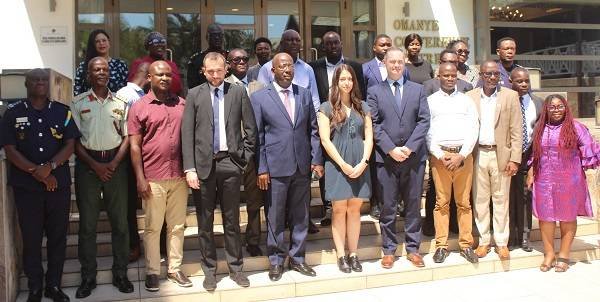A three-day workshop has been held in Accra to start an assessment of Ghana’s ability to prevent and respond to Improvised Explosive Devices (IEDs) incidents as part of efforts to enhance national security.
IEDs are homemade bombs that are created and used by people who are not part of a regular military, and hidden in everyday objects for harmful purposes, including acts of terrorism.
Led by the National Commission on Small Arms and Light Weapons (NCSALW), the stakeholders are using the National Counter-IED Preparedness and Response Capability Maturity Model Self-Assessment Tool.
Facilitated by the Small Arms Survey, a programme of the Graduate Institute of International and Development Studies in Switzerland, the tool was developed by the United Nations to assist member states to self-identify challenges in preparedness and response to IEDs to boost the safety of citizenry.
Participants of the maiden workshop that ended on Friday, included representatives of securities agencies and other related bodies who would spend weeks to identify robust upstream and downstream measures to overcome gaps and challenges.
The Minister for the Interior, Ambrose Dery, in a speech read on his behalf by the Ministry’s Chief Director, Adelaide Anno-Kumi, said IEDs constituted a major threat to security and stability in West Africa.
He said Ghana had taken keen interest in the Counter-IED Capability Maturity Model and Self-Assessment Tool because it was one of the effective ways to protect citizens from the devastating effects of IEDs.
“We are also confident that this assessment will help Ghana to develop a more effective and comprehensive C-IED response that will benefit not only Ghana, but the entire West African Region,” he said.
Mr Dery expressed the commitment of the Ministry of the Interior to support initiatives to deal with IEDs and urged personnel involved in the assessment to be diligent.
The Executive Secretary of the NCSALW, Samuel Williams Yeboah, said the commission was concerned about the use of IEDs by non-state actors such as terrorists, insurgents, criminals, and militias as they posed a serious threat to security, peace, and development in Ghana and the West African Sub Region.
He said with the small arms and light weapons serving as the building blocks of IEDs, it was important to scale up efforts to counter the threat of IEDs in Ghana to promote public peace and safety.
“Dealing with IED’s is a challenge that the NCSALW is committed to tackling head-on, for the sake of our national and regional peace, security, and the well-being of all our citizens,” he said.
For his part, the Small Arms Survey C-IED Advisor, Paul Amoroso, said there had been increased use of IEDs in West Africa and the Sahel, since 2012, leading to casualties amongst civilians and security officials and contributing to political instability.
He said although Ghana had not been directly impacted by IED incidents, it was critical for the country to develop suitable counter-IED capabilities, should an IED threat emerge in the future.
BY JONATHAN DONKOR & NII AYITEY BROWN

